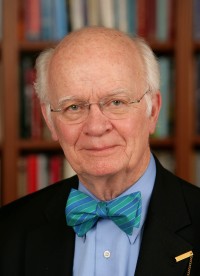There’s hope for optimism
Optimism is hard to come by this autumn. Don't confuse it with hope, in any case. In the best of circumstances I agree with Elbert Hubbard: optimism is "fatty degeneration of intelligence." In any circumstances I remain with Oscar Wilde: "The basis of optimism is sheer terror." In the present circumstances the terror is sufficiently palpable to remove occasions for that fatty degeneration.
How do I sustain a light heart this autumn? By 5:58 a.m. I daily dash back into the bedroom to turn off the alarm before my spouse's radio invades with news of the Asian economy, the Washington scene, Laramie, Bosnia, the NBA strike, etc. I scan the newspapers.
For a moment things looked up when I saw in a headline the word "optimists"--"Key finds bolster optimists." The story talked about the possibility of life existing on other planets. "There has been a revival in the serious search for life," says Stanford University scientist Chris Chyba. Where? In inert churches? Among lifeless believers going through the motions of believing? Among those long benumbed by the New Age meditators? Finding life in those places would cheer us.
No, it is the belief that conditions may be right for life forms to survive in more remote stretches of the universe. Of course, there is a qualification: "Yet even with the new optimism that life is out there, many scientists believe the evolution of intelligent life remains highly uncertain."
I am faithfully (with the emphasis on faith) committed to rejoicing in scientific discovery. But this kind, for all its appeal to curiosity and intelligence, inspires little optimism or hope. The center of our Milky Way is 30,000 light-years away and the Andromeda galaxy 2.5 million light-years away. So communication between us and the microbes out there is not likely. One has to look elsewhere for signs of hope.
I found signs in some other stories in the newspaper that day. One teeny story far from the front page was: "U.S. Teenage Pregnancies at 20-Year Low." The article also reported that the abortion rate dropped during the first half of this decade. That is very good news.
When I got to the local sections of the paper, which means when I got closer to real people, intelligent life close up, things brightened more. The city honored a policeman killed in the line of duty by naming a street after him. A photo shows his mother carrying the street sign, "Michael Ceriale Street." She is smiling. Another picture, "Girl's Parents Raise Funds--and Hope," shows a mother holding her daughter, who is afflicted with Sanfilippo's syndrome. The family is raising money for research of the disease. "Work is a Test of Faith for Muslims" features the picture of an executive who finds it inconvenient but necessary to pray five times a day. And so he prays.
From the obituary page a familiar face smiles at me. I knew Margaret Pfrommer, who contracted polio in 1956 and became paraplegic. This woman of faith turned into a "fiesty and revered advocate for the disabled for 25 years." It took hours for her even to get to work, but she chose to live alone with the help of drop-in aides. Margaret used a "sip and puff" straw to answer phones, operate a computer, take communion and more. She combined creative anger and angrily creative faith. A Loyola professor: "She is one of the most remarkable human beings I've ever met. She had a desire to serve others beyond any person I've ever met." You don't need optimism when people like Margaret breathe hope, even if through that sip-and-puff straw.





